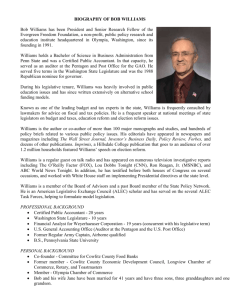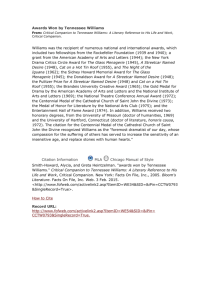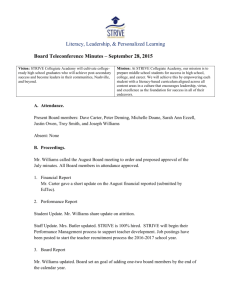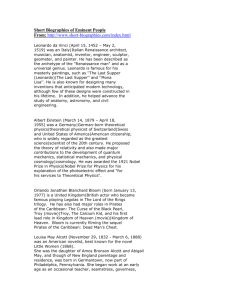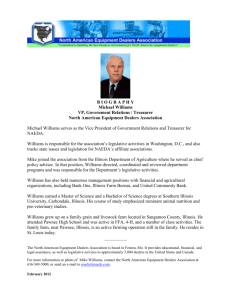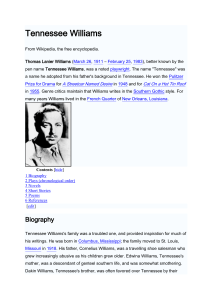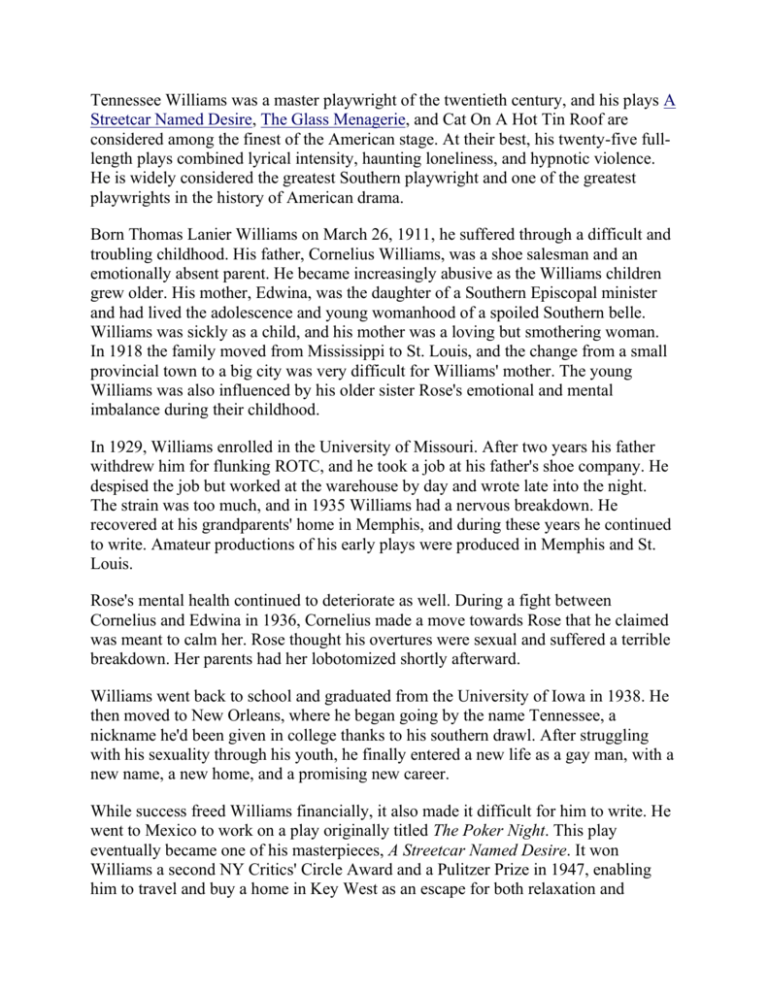
Tennessee Williams was a master playwright of the twentieth century, and his plays A
Streetcar Named Desire, The Glass Menagerie, and Cat On A Hot Tin Roof are
considered among the finest of the American stage. At their best, his twenty-five fulllength plays combined lyrical intensity, haunting loneliness, and hypnotic violence.
He is widely considered the greatest Southern playwright and one of the greatest
playwrights in the history of American drama.
Born Thomas Lanier Williams on March 26, 1911, he suffered through a difficult and
troubling childhood. His father, Cornelius Williams, was a shoe salesman and an
emotionally absent parent. He became increasingly abusive as the Williams children
grew older. His mother, Edwina, was the daughter of a Southern Episcopal minister
and had lived the adolescence and young womanhood of a spoiled Southern belle.
Williams was sickly as a child, and his mother was a loving but smothering woman.
In 1918 the family moved from Mississippi to St. Louis, and the change from a small
provincial town to a big city was very difficult for Williams' mother. The young
Williams was also influenced by his older sister Rose's emotional and mental
imbalance during their childhood.
In 1929, Williams enrolled in the University of Missouri. After two years his father
withdrew him for flunking ROTC, and he took a job at his father's shoe company. He
despised the job but worked at the warehouse by day and wrote late into the night.
The strain was too much, and in 1935 Williams had a nervous breakdown. He
recovered at his grandparents' home in Memphis, and during these years he continued
to write. Amateur productions of his early plays were produced in Memphis and St.
Louis.
Rose's mental health continued to deteriorate as well. During a fight between
Cornelius and Edwina in 1936, Cornelius made a move towards Rose that he claimed
was meant to calm her. Rose thought his overtures were sexual and suffered a terrible
breakdown. Her parents had her lobotomized shortly afterward.
Williams went back to school and graduated from the University of Iowa in 1938. He
then moved to New Orleans, where he began going by the name Tennessee, a
nickname he'd been given in college thanks to his southern drawl. After struggling
with his sexuality through his youth, he finally entered a new life as a gay man, with a
new name, a new home, and a promising new career.
While success freed Williams financially, it also made it difficult for him to write. He
went to Mexico to work on a play originally titled The Poker Night. This play
eventually became one of his masterpieces, A Streetcar Named Desire. It won
Williams a second NY Critics' Circle Award and a Pulitzer Prize in 1947, enabling
him to travel and buy a home in Key West as an escape for both relaxation and
writing. The year 1951 brought The Rose Tattoo and Williams' first Tony award, as
well as the successful film adaptation of A Streetcar Named Desire, starring Vivian
Leigh.
Around this time, Williams met Frank Merlo. The two fell in love, and the young man
became Williams' romantic partner until Merlo's untimely death in 1961. He was a
steadying influence on Williams, who suffered from depression and lived in fear that
he, like his sister Rose, would go insane.
The sixties brought hard times for Tennessee Williams. He had become dependent on
drugs, and the problem only grew worse after the death of Frank Merlo in 1961.
Merlo's death from lung cancer sent Williams into a deep depression that lasted ten
years. Williams was also insecure about his work, which was sometimes of
inconsistent quality, and he was violently jealous of younger playwrights.
His sister Rose was in his thoughts during his later work.



